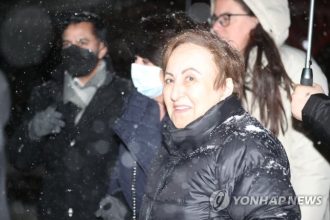What Is the Role of the State When Koreans Are Chained and Wrongly Imprisoned Abroad?
Raid only days after South Korea pledges massive $150 billion investment in U.S.

as reported by the U.S. Immigration and Customs Enforcement (ICE) on its website on September 5.
By Lee Sang-ki,
AsiaN reporter, former president of the Korea Journalists Association
SEOUL: The video released by U.S. Immigration and Customs Enforcement (ICE) showing Korean workers at the Hyundai–LG battery plant in Georgia chained at the waist and ankles and herded onto buses was shocking. More than 300 Koreans were among the 475 people detained in what looked like a military operation. For those caught up in it, the trauma will last far beyond that moment.
ICE explained that these workers had violated visa conditions and were therefore working illegally. Legally speaking, the agency was enforcing U.S. law. But why did such an unprecedented operation take place only days after South Korea pledged a massive 200 trillion won ($150 billion) investment in the United States at a “successful” summit meeting? And why were Koreans singled out in such a visible way? President Trump insisted that “ICE was just doing its job,” distancing himself from the matter. Yet it is difficult to believe that the largest single-site operation in ICE history could have been carried out without the president’s office being informed in advance.
This scene inevitably recalls another case from a decade ago in Canada—the ordeal of Reverend Jeon Dae-geun. In April 2015, on his way to work as an administrator at North Light College in Toronto, he was suddenly arrested by federal police and accused of being the ringleader of an Asian sex trafficking ring. For 32 months he was held in detention in Montreal. International broadcasters showed his face worldwide as a criminal suspect. Eventually, the prosecution failed to provide any evidence to sustain the charges, and he was released without conviction. By then his school had been shut down, his documents and residency papers withheld, and his health seriously damaged. Even now, he continues to suffer from the consequences.

Both cases—one in the United States, one in Canada—share a common feature: under the banner of law enforcement, Koreans were subjected to excessive measures, their dignity trampled and their lives overturned. In both instances, the protection provided by the Korean state was woefully insufficient.
True national prestige is not measured by photographs of smiling leaders at summit meetings or the size of investment pledges. It is measured by whether the state can defend even a single citizen from unjust chains and wrongful imprisonment abroad. If Korea aspires to be a global pivotal state, protecting its citizens overseas must be the starting point.
The Asian Journalist Association and The AsiaN have documented and borne witness to such injustices for years. If we cease to do so, these abuses will only be repeated. The chained workers in Georgia and the wrongly imprisoned pastor in Montreal ask us all a searing question: “Where were the state, the society, and the media?” It is time to answer.




